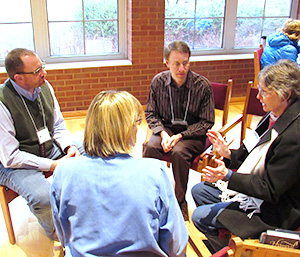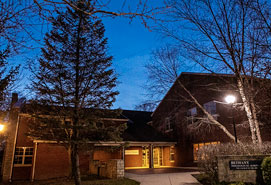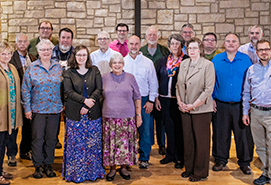“God’s Green Earth” Witnesses to Creation Care

From food deserts to sabbath keeping, Bethany Seminary’s recent Presidential Forum and Young Adult Event touched on many aspects of our relationship with God’s creation. Guests for God’s Green Earth, A Call to Care and Witness gathered March 16-19 at the Seminary for presentations, discussion, Bible study, and worship intended to generate new awareness, creative thinking, and communication about our impact on the planet we call home. Although the diversity and complexity of creation care issues—well represented at this event—can generate questions, concern, and even discouragement, a sense of hope and engagement was present in word and thought throughout the weekend.”
Noted teachers, speakers, and activists joined Bethany faculty and students at the podium over the weekend, including Barbara Rossing of the Lutheran School of Theology and Betty Holley of Payne Theological Seminary. To address God’s vision for creation, Rossing began with the conclusion of the biblical texts: Revelation. Offering a message of hope, she spoke of the Bible’s message as being that the world is about to turn, not to end. For ancient people, the concept of apocalypse spoke to the imagination and not their fear. If we live into the alternative world provided by the apocalypse, we can grasp this amazing moment for the church in today’s world: helping others find abundant life. The image of the tree of life can convey the connectedness of creation, a vision for the earth as well as of heaven.
Betty Holley, an associate professor of ecological theology helped demonstrate the broad scope of the weekend’s theme with the Earth Charter, describing it as the “most inclusive civil society document ever negotiated.” Both a document and a movement, the Charter was completed in 2000 with the input of thousands of people worldwide. The themes of the Charter—respect and care for the community of life; ecological integrity; social and economic justice; and democracy, nonviolence, and peace—are defined by principles to which all can aspire, no matter one’s profession or walk of life. The Charter can help us develop a global ethic, and many practices and materials derived from it are being used around the globe.
Scripture was again the focus in two creation-themed Bible studies by Rossing and Dan Ulrich, Wieand Professor of New Testament Studies at Bethany. Focusing on Genesis 1, Rossing emphasized the original Hebrew wording: God saw that it was beautiful, from the diversity of life to the perfection of the atmosphere that enables life. Ulrich examined the opening verses of the Gospel of John from a first-century Christian mindset. Jewish poetry often paired the Word (logos) with wisdom (sophia), which was venerated as the means by which God created the world. With these terms and concepts present in John’s first chapter, we can read this Gospel as a witness for valuing creation.
The Bethany faculty was also represented by Nate Inglis, assistant professor of theological studies. He presented three viewpoints of understanding creation: ecological imperialism, the right to use creation as we wish; ecological stewardship, equating our own self-interest with God’s interest; and ecological kinship, seeing intrinsic value in the community of life as a whole. Listeners were guided to reflect with each other on their own creation views, and Inglis concluded with the relevance of Anabaptist values to the ecological kinship view: Being in relationship is essential to practicing one’s faith, and the well-being of others need not come at the expense of one’s own.
The relationship of science and faith was affirmed by two of the featured speakers. A PhD student in geographical science, Rachel Lamb is a young, impassioned voice for addressing climate change. Her defining moment came while observing Native Americans struggling with a changing environment, and through research and personal discernment, she found a vocational call. Realizing that her Christian identity included responsibility for protecting the world God created, she became a leader with Young Evangelicals for Climate Action. God’s command to love our neighbor means accepting responsibility for contributing to problems that less-advantaged people face; the call to be in right relationships means pursuing reconciliation with all of creation, having participated in its brokenness. She offered two fundamental responses for Christians: “Fight skepticism in pursuit of truth,” and “fight despair because we can claim hope.”
A seasoned professor of natural science at McPherson College (Kansas), Jonathan Frye revealed how science can inform our ethics of natural resource stewardship. He began with an overview of scientific processes—describing them as the “most collaborative work in the world”—and noted how gathering information to formulate theories can impact personal attitude and conviction. As the source of our understanding of the natural world, science can help us approach stewardship with humility, cooperation, advocacy, and the assumption of responsibility for consequences.
The event was cosponsored by Seminary Stewardship Alliance (SSA), a consortium of schools committed to incorporating good stewardship practices into their educational objectives. Members of Bethany’s chapter, called Green Circle, helped bring Matthew Sleeth and A. J. Swoboda into the group of speakers. A former medical doctor who underwent a radical lifestyle change, Sleeth founded the creation care organization Blessed Earth, which launched SSA in 2012. In speaking about the importance and challenges of creation care ministry, he reflected on the references to trees and wood throughout scripture and the need to teach how they represent spiritual and relational connections.
Pastor, author, and professor A. J. Swoboda, executive director of SSA, challenged guests to truly observe the sabbath, part of God’s plan that is often overlooked as part of creation. As the only day of creation that scripture calls holy, this time of rest is necessary for well-being and even survival. Stories of his own family’s observance of sabbath illustrated how this concept is contrary to the culture we have created, a lifestyle damaging not only to ourselves but to other forms of life on the planet.
Bethany seniors Jonathan Stauffer and Chibuzo Petty, both involved with Green Circle at Bethany, addressed the social issue of food justice. Since World War II, the shift in farming to more corporate and industrial processes, the use of more petrol-based products, and a population exodus from rural communities have affected availability of food. Higher quality food goes to those who can pay, even though it may come from less food-secure areas. In addition to food deserts, we can refer to “food prisons” in urban areas—a lack of food due to socioeconomic and political forces rather than to a naturally occurring phenomenon.
For the past two years, Bethany senior and Green Circle member Katie Heishman has made a significant effort to live more simply by reducing her consumption of resources. She shared her story, describing her topic with the question, “What do homemade recipes, reducing waste, and unpackaged groceries have to do with following Jesus and loving our neighbor?” From refusing straws at restaurants to refusing paper handouts that are also online, she encouraged broader thinking about our endless consumption of resources. (Her experience is also described in a recent post on the Brethren Life & Thought blog.)
Second-year student Elizabeth Ullery Swenson acknowledged that starting a church plant during one’s first year in seminary is not something she would recommend. But the time was right for this venture, an innovative way to experience worship called WildWood Gathering in Olympia, Washington. Ullery Swenson gave listeners a taste of the WildWood community by leading them through a worship experience, with time for creative expression and mindfulness of the larger community of life surrounding them.
Bethany welcomed back teacher, lecturer, and scholar Frank Thomas as preacher for the closing worship service. Thomas is the Nettie Sweeney and Hugh Th. Miller Professor of Homiletics at Christian Theological Seminary in Indianapolis and is considered one of the most creative and prominent thought leaders of this generation. His sermon, “You Never Know What Will Be Required,” drew upon the words of Jesus in Luke 9:57-62. To those who would first attend to personal business when called to follow him, Jesus replies, “No one who puts a hand to the plow and looks back is fit for service in the kingdom of God.”
God’s Green Earth opened and closed with panel discussions, dialog not just among panelists but with the audience. Guests also gathered in affinity groups to further explore the weekend’s topics with presenters. Acknowledgment of compassion fatigue, the possibility of Christianity coexisting with consumer capitalism, and suggestions for personal action are but a small sample of what guests prepared to take home with them. Perhaps these settings best represented how to begin answering the call to care and witness: listening, learning, and working together.
Writings from some of the presenters at God’s Green Earth, A Call to Care and Witness are being featured in the Brethren Life & Thought blog. Current and past posts are available.
“Can there be a healthy church on a sick planet? If you say yes, you have bought into a divorce between heaven and earth that is not biblical.” – Barbara Rossing








 Green Circle: Bethany invests in 100% renewable energy.
Green Circle: Bethany invests in 100% renewable energy.